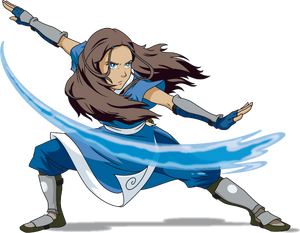Katara (Avatar: The Last Airbender)
Katara is a fictional character in the Nickelodeon animated television series Avatar: The Last Airbender, created by Michael Dante DiMartino and Bryan Konietzko. Introduced as a main character in the series' first episode, "The Boy in the Iceberg", Katara is a young waterbender from the Southern Water Tribe, a small, isolated community located at the South Pole. Throughout the series, she becomes a close friend and eventual love interest of the protagonist, Aang, the last surviving Airbender and the titular Avatar, whose destiny is to save the world from the tyranny of the Fire Nation.
Character Overview[edit | edit source]
Katara is characterized by her deep sense of justice, compassion, and her formidable waterbending abilities. At the beginning of the series, she is one of the only remaining waterbenders in the Southern Water Tribe, her skills initially self-taught from what little she could learn before meeting Aang. As the series progresses, Katara's waterbending abilities grow significantly, especially after she and her brother, Sokka, travel to the Northern Water Tribe where she receives formal training. Katara's character development is marked by her journey from a young girl with a burgeoning talent in waterbending to a powerful and confident master of her craft.
Role in Avatar: The Last Airbender[edit | edit source]
Katara, along with her brother Sokka, discovers Aang frozen in an iceberg near their home in the Southern Water Tribe. After freeing him, they learn that he is the Avatar, a being capable of mastering all four elements: water, earth, fire, and air. Katara and Sokka join Aang on his quest to master the elements and defeat the Fire Nation, bringing peace to the world. Throughout their journey, Katara serves as a moral compass for the group, often providing emotional support and guidance to her friends. Her waterbending skills also prove to be invaluable in various battles and challenges the group faces.
Katara's personal journey includes confronting her mother's death at the hands of the Fire Nation, which fuels her deep-seated hatred for the Fire Nation. However, through her experiences, she learns the importance of forgiveness and healing, both emotionally and physically, as she also possesses the rare ability to heal with waterbending.
Abilities[edit | edit source]
Katara is a highly skilled waterbender, capable of manipulating water in various forms, from liquid to ice and steam. Her abilities include creating whips of water, forming ice projectiles, and controlling large bodies of water for defensive and offensive purposes. As she grows more skilled, she learns advanced techniques such as waterbending healing, which allows her to heal injuries, and bloodbending, a controversial technique that enables her to control the water within living organisms. However, due to the ethical implications, she vows to never use bloodbending again after being forced to utilize it under dire circumstances.
Legacy[edit | edit source]
Katara's character has been well-received by fans and critics alike, praised for her complexity, growth, and strength. She is considered a role model for her determination, empathy, and commitment to her values. Katara has left a lasting impact on the Avatar: The Last Airbender series and its extended universe, including the sequel series The Legend of Korra, where she appears as an elderly woman and a revered waterbending master.
Search WikiMD
Ad.Tired of being Overweight? Try W8MD's physician weight loss program.
Semaglutide (Ozempic / Wegovy and Tirzepatide (Mounjaro / Zepbound) available.
Advertise on WikiMD
|
WikiMD's Wellness Encyclopedia |
| Let Food Be Thy Medicine Medicine Thy Food - Hippocrates |
Translate this page: - East Asian
中文,
日本,
한국어,
South Asian
हिन्दी,
தமிழ்,
తెలుగు,
Urdu,
ಕನ್ನಡ,
Southeast Asian
Indonesian,
Vietnamese,
Thai,
မြန်မာဘာသာ,
বাংলা
European
español,
Deutsch,
français,
Greek,
português do Brasil,
polski,
română,
русский,
Nederlands,
norsk,
svenska,
suomi,
Italian
Middle Eastern & African
عربى,
Turkish,
Persian,
Hebrew,
Afrikaans,
isiZulu,
Kiswahili,
Other
Bulgarian,
Hungarian,
Czech,
Swedish,
മലയാളം,
मराठी,
ਪੰਜਾਬੀ,
ગુજરાતી,
Portuguese,
Ukrainian
Medical Disclaimer: WikiMD is not a substitute for professional medical advice. The information on WikiMD is provided as an information resource only, may be incorrect, outdated or misleading, and is not to be used or relied on for any diagnostic or treatment purposes. Please consult your health care provider before making any healthcare decisions or for guidance about a specific medical condition. WikiMD expressly disclaims responsibility, and shall have no liability, for any damages, loss, injury, or liability whatsoever suffered as a result of your reliance on the information contained in this site. By visiting this site you agree to the foregoing terms and conditions, which may from time to time be changed or supplemented by WikiMD. If you do not agree to the foregoing terms and conditions, you should not enter or use this site. See full disclaimer.
Credits:Most images are courtesy of Wikimedia commons, and templates Wikipedia, licensed under CC BY SA or similar.
Contributors: Prab R. Tumpati, MD

